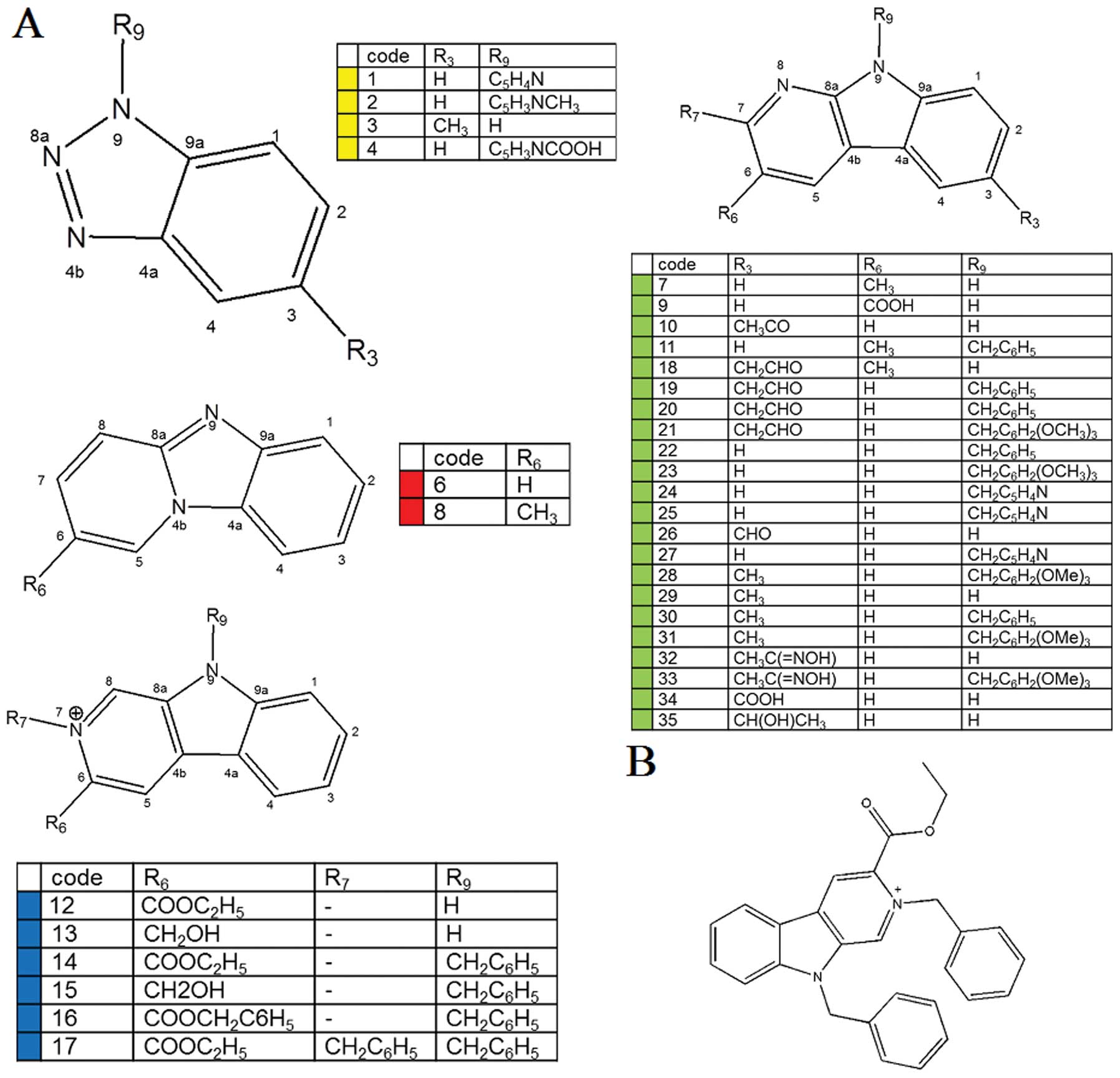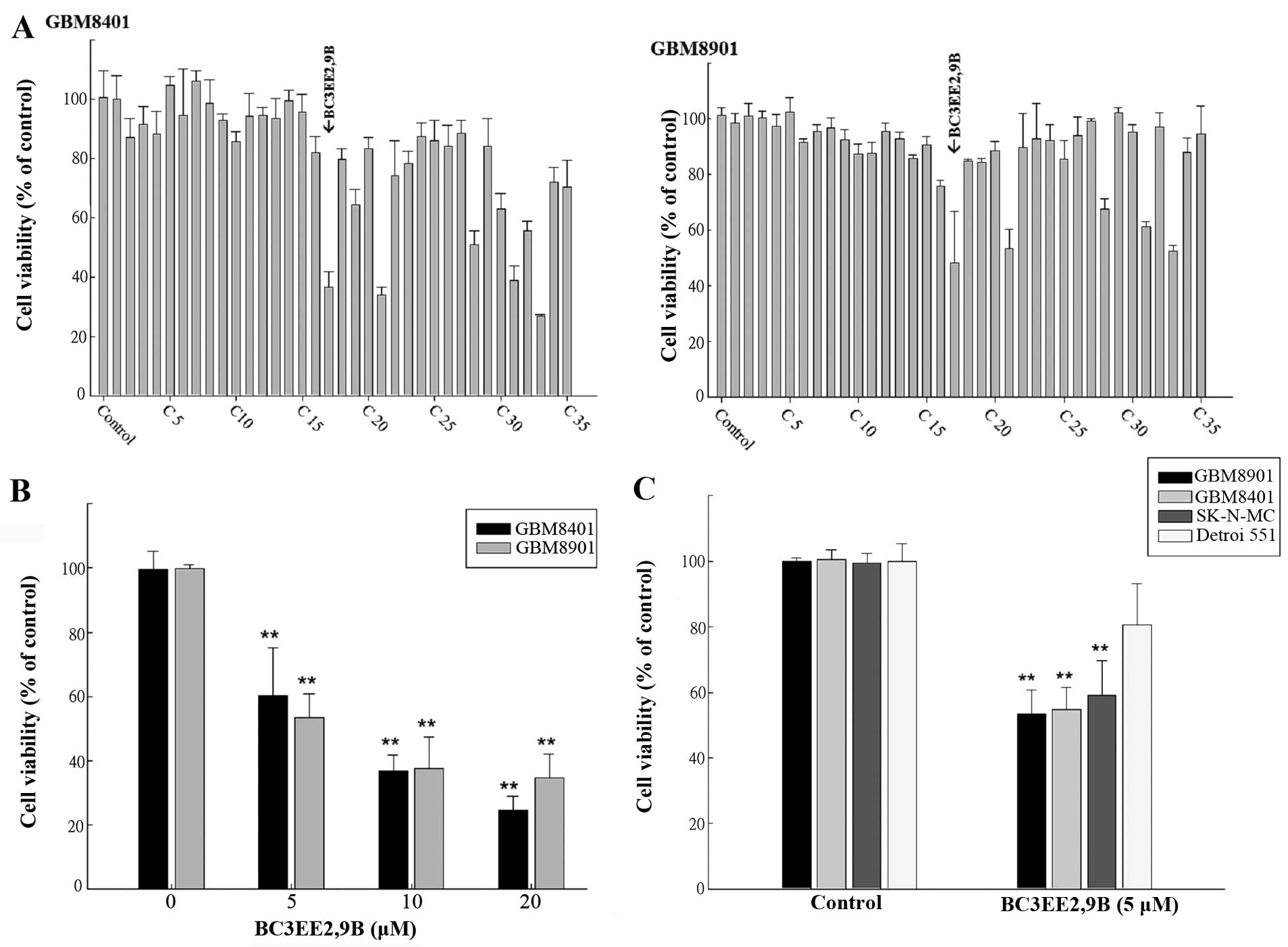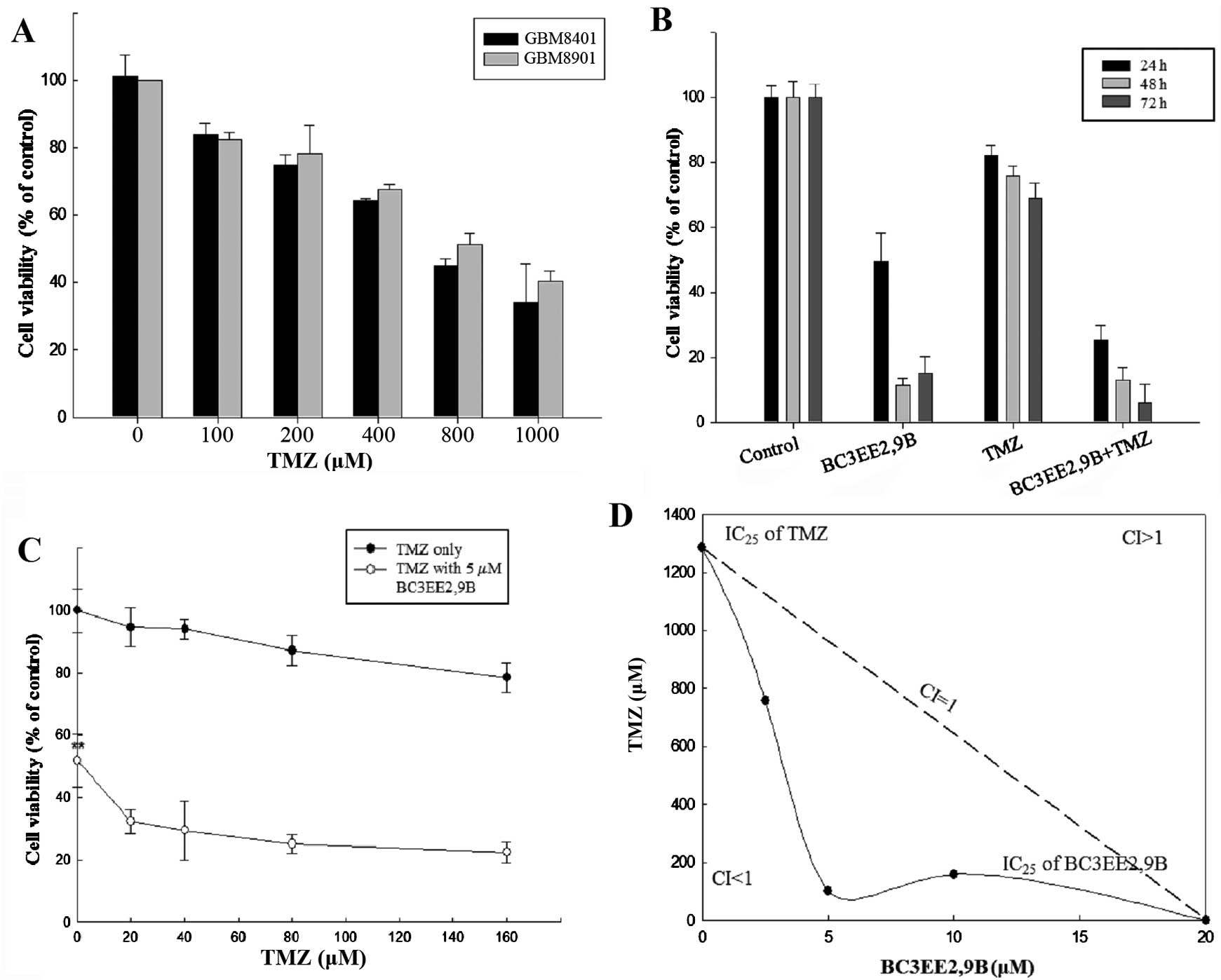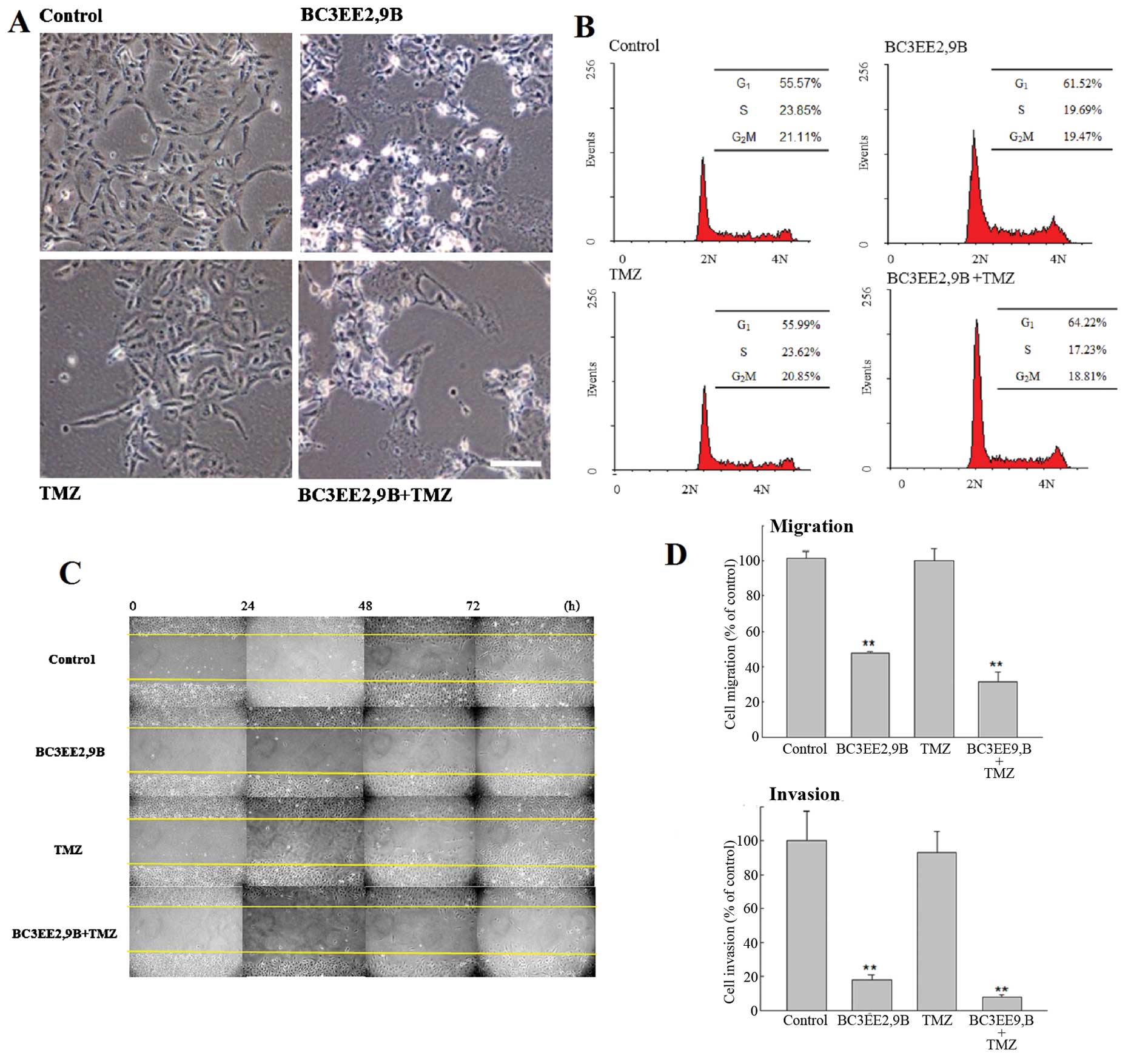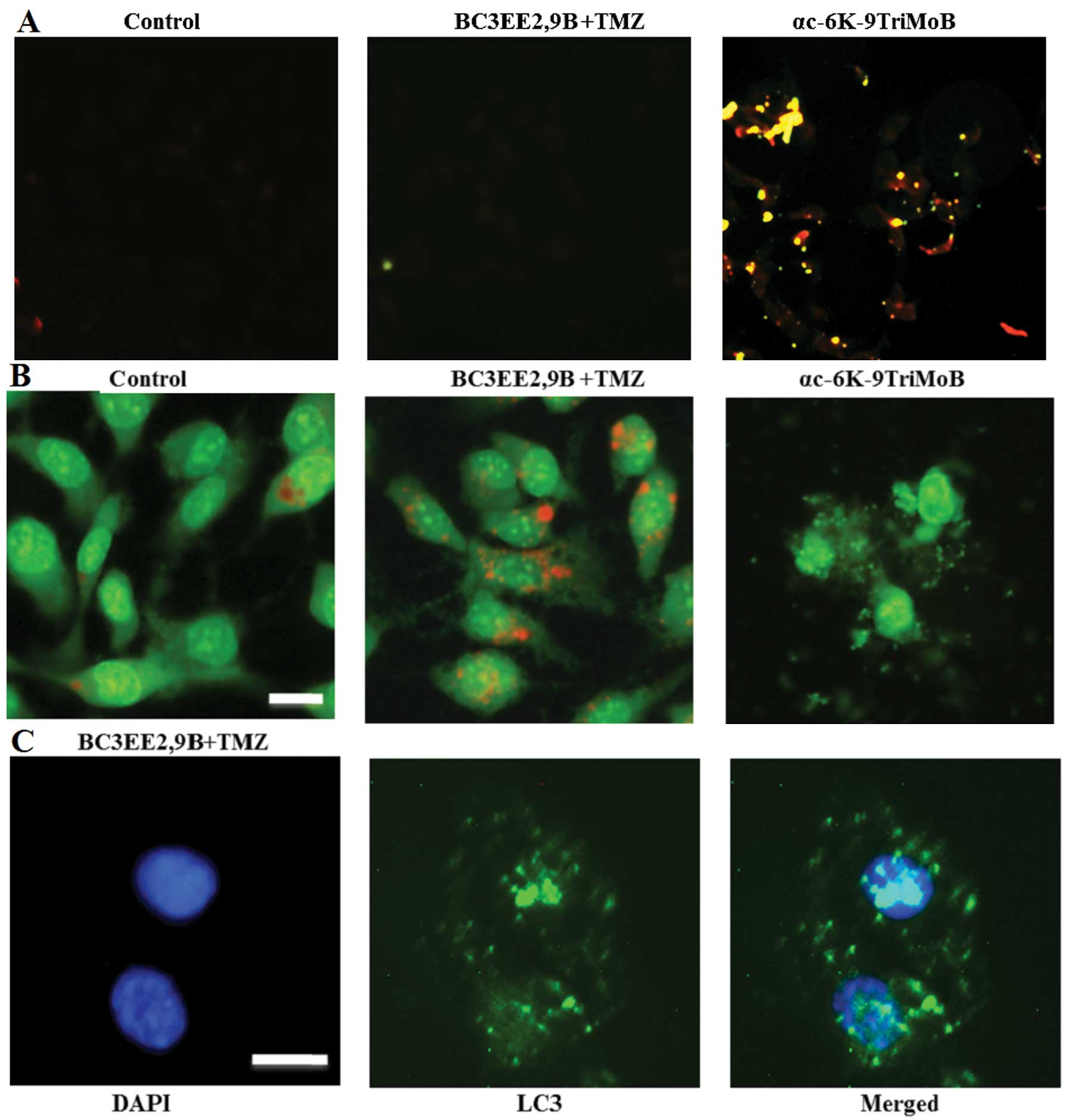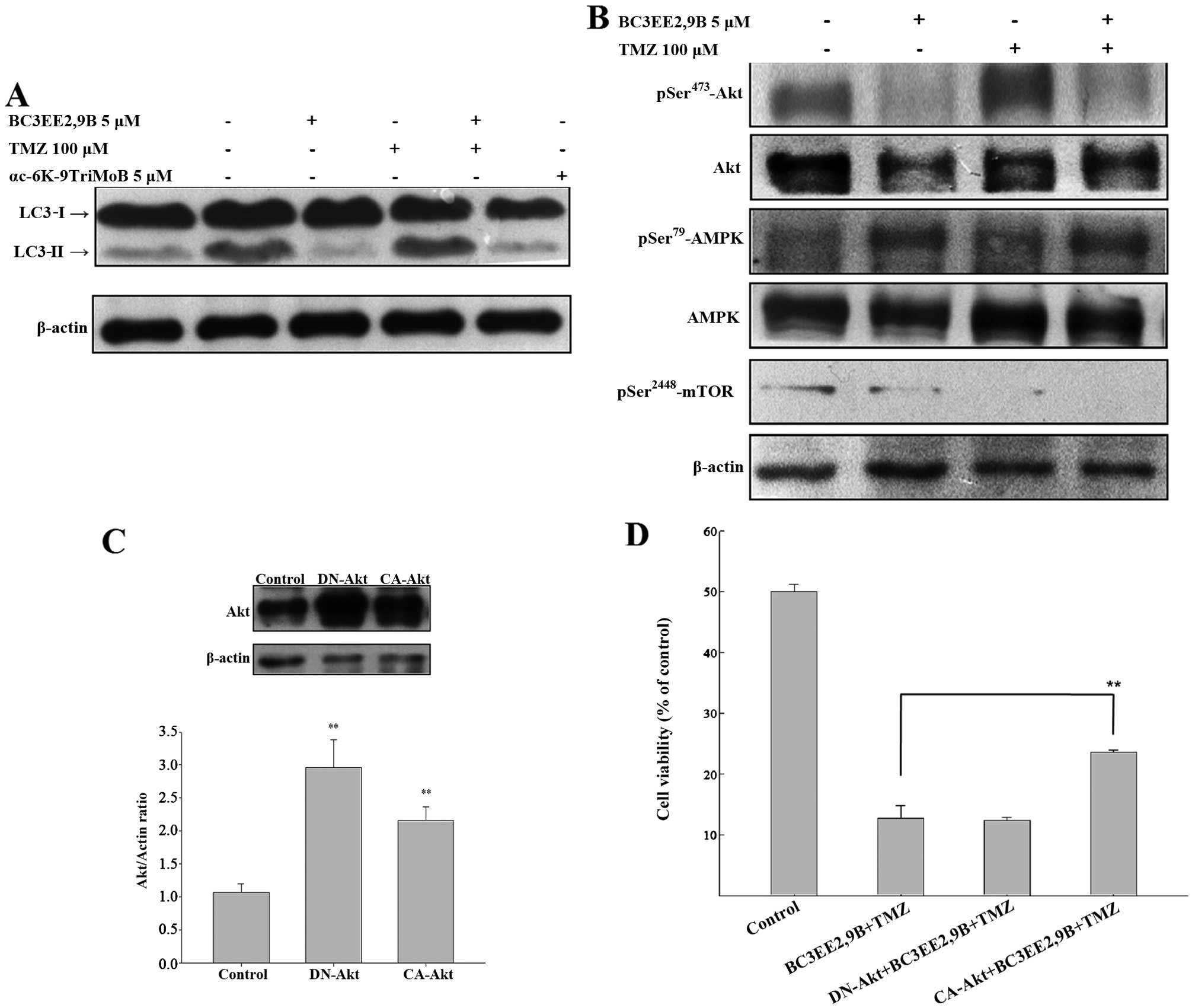|
1
|
Hess KR, Broglio KR and Bondy ML: Adult
glioma incidence trends in the United States 1977–2000. Cancer.
101:2293–2299. 2004. View Article : Google Scholar : PubMed/NCBI
|
|
2
|
Adamson C, Kanu OO, Mehta AI, Di C, Lin N,
Mattox AK and Bigner DD: Glioblastoma multiforme: A review of where
we have been and where we are going. Expert Opin Investig Drugs.
18:1061–1083. 2009. View Article : Google Scholar : PubMed/NCBI
|
|
3
|
Omuro A and DeAngelis LM: Glioblastoma and
other malignant gliomas: A clinical review. JAMA. 310:1842–1850.
2013. View Article : Google Scholar : PubMed/NCBI
|
|
4
|
Roos WP, Batista LF, Naumann SC, Wick W,
Weller M, Menck CF and Kaina B: Apoptosis in malignant glioma cells
triggered by the temozolomide-induced DNA lesion
O6-methylguanine. Oncogene. 26:186–197. 2007. View Article : Google Scholar
|
|
5
|
Brandes AA, Tosoni A, Franceschi E, Sotti
G, Frezza G, Amistà P, Morandi L, Spagnolli F and Ermani M:
Recurrence pattern after temozolomide concomitant with and adjuvant
to radiotherapy in newly diagnosed patients with glioblastoma:
Correlation with MGMT promoter methylation status. J Clin Oncol.
27:1275–1279. 2009. View Article : Google Scholar : PubMed/NCBI
|
|
6
|
Murrow L and Debnath J: Autophagy as a
stress-response and quality-control mechanism: Implications for
cell injury and human disease. Annu Rev Pathol. 8:105–137. 2013.
View Article : Google Scholar
|
|
7
|
Shen HM and Codogno P: Autophagic cell
death: Loch Ness monster or endangered species? Autophagy.
7:457–465. 2011. View Article : Google Scholar
|
|
8
|
Lefranc F, Facchini V and Kiss R:
Proautophagic drugs: A novel means to combat apoptosis-resistant
cancers, with a special emphasis on glioblastomas. Oncologist.
12:1395–1403. 2007. View Article : Google Scholar
|
|
9
|
Edinger AL and Thompson CB: Death by
design: Apoptosis, necrosis and autophagy. Curr Opin Cell Biol.
16:663–669. 2004. View Article : Google Scholar : PubMed/NCBI
|
|
10
|
Chen N and Karantza-Wadsworth V: Role and
regulation of autophagy in cancer. Biochim Biophys Acta.
1793:1516–1523. 2009. View Article : Google Scholar : PubMed/NCBI
|
|
11
|
Chen C, Chen J and Zhao KN: Editorial:
Signalling pathways in anti-cancer drug resistance. Curr Med Chem.
21:3007–3008. 2014. View Article : Google Scholar : PubMed/NCBI
|
|
12
|
Mathew R, Karantza-Wadsworth V and White
E: Role of autophagy in cancer. Nat Rev Cancer. 7:961–967. 2007.
View Article : Google Scholar : PubMed/NCBI
|
|
13
|
Zeng X and Kinsella TJ: A novel role for
DNA mismatch repair and the autophagic processing of chemotherapy
drugs in human tumor cells. Autophagy. 3:368–370. 2007. View Article : Google Scholar : PubMed/NCBI
|
|
14
|
Kanzawa T, Germano IM, Komata T, Ito H,
Kondo Y and Kondo S: Role of autophagy in temozolomide-induced
cytotoxicity for malignant glioma cells. Cell Death Differ.
11:448–457. 2004. View Article : Google Scholar : PubMed/NCBI
|
|
15
|
Math M and Balasubramaniam P: Curry leaves
(Murraya Koenigii spreng) and halitosis. BMJ (South Asia ED).
19:2112003.
|
|
16
|
Tsao LT, Lee CY, Huang LJ, Kuo SC and Wang
JP: Inhibition of lipopolysaccharide-stimulated nitric oxide
production in RAW 264.7 macrophages by a synthetic carbazole,
LCY-2-CHO. Biochem Pharmacol. 63:1961–1968. 2002. View Article : Google Scholar : PubMed/NCBI
|
|
17
|
Arbiser JL, Govindarajan B, Battle TE,
Lynch R, Frank DA, Ushio-Fukai M, Perry BN, Stern DF, Bowden GT,
Liu A, et al: Carbazole is a naturally occurring inhibitor of
angiogenesis and inflammation isolated from antipsoriatic coal tar.
J Invest Dermatol. 126:1396–1402. 2006. View Article : Google Scholar : PubMed/NCBI
|
|
18
|
Hajbi Y, Neagoie C, Biannic B, Chilloux A,
Vedrenne E, Baldeyrou B, Bailly C, Mérour JY, Rosca S, Routier S,
et al: Synthesis and biological activities of new
furo[3,4-b]carbazoles: Potential topoisomerase II inhibitors. Eur J
Med Chem. 45:5428–5437. 2010. View Article : Google Scholar : PubMed/NCBI
|
|
19
|
Yoon S, Kim JH, Lee YJ, Ahn MY, Choi G,
Kim WK, Yang Z, Lee HJ, Moon HR and Kim HS: A novel carbazole
derivative, MHY407, sensitizes cancer cells to doxorubicin-,
etoposide-, and radiation treatment via DNA damage. Eur J
Pharmacol. 697:24–31. 2012. View Article : Google Scholar : PubMed/NCBI
|
|
20
|
Liu CH, Lin C, Tsai KJ, Chuang YC, Huang
YL, Lee TH, Huang LJ and Chan HC: Biological evaluation of
9-[(6-chloro-pyridin-4-yl)methyl]-9H-carbazole-3-carbinol as an
anticancer agent. Oncol Rep. 29:1501–1509. 2013.PubMed/NCBI
|
|
21
|
Kang CC, Huang WC, Kouh CW, et al:
Chemical principles for the design of a novel fluorescent probe
with high cancer-targeting selectivity and sensitivity. Integr
Biol. 5:1217–1228. 2013. View Article : Google Scholar
|
|
22
|
Mizushima N and Yoshimori T: How to
interpret LC3 immunoblotting. Autophagy. 3:542–545. 2007.
View Article : Google Scholar : PubMed/NCBI
|
|
23
|
Gozuacik D and Kimchi A: Autophagy as a
cell death and tumor suppressor mechanism. Oncogene. 23:2891–2906.
2004. View Article : Google Scholar : PubMed/NCBI
|
|
24
|
Zembower DE, Xie Y, Koohang A, Kuffel MJ,
Ames MM, Zhou Y, Mishra R, Mar AA, Flavin MT and Xu ZQ:
Methylenedioxy-and ethylenedioxy-fused indolocarbazoles: Potent
human topoisomerase I inhibitors and antitumor agents. Anticancer
Agents Med Chem. 12:1117–1131. 2012. View Article : Google Scholar : PubMed/NCBI
|
|
25
|
Lee YK, Park SY, Kim YM, Kim DC, Lee WS,
Surh YJ and Park OJ: Suppression of mTOR via Akt-dependent and
-independent mechanisms in selenium-treated colon cancer cells:
Involvement of AMPKalpha1. Carcinogenesis. 31:1092–1099. 2010.
View Article : Google Scholar : PubMed/NCBI
|
|
26
|
Puissant A, Robert G, Fenouille N, Luciano
F, Cassuto JP, Raynaud S and Auberger P: Resveratrol promotes
autophagic cell death in chronic myelogenous leukemia cells via
JNK-mediated p62/SQSTM1 expression and AMPK activation. Cancer Res.
70:1042–1052. 2010. View Article : Google Scholar : PubMed/NCBI
|
|
27
|
Xavier CP, Lima CF, Pedro DF, Wilson JM,
Kristiansen K and Pereira-Wilson C: Ursolic acid induces cell death
and modulates autophagy through JNK pathway in apoptosis-resistant
colorectal cancer cells. J Nutr Biochem. 24:706–712. 2013.
View Article : Google Scholar
|
|
28
|
Hau AM, Greenwood JA, Löhr CV, Serrill JD,
Proteau PJ, Ganley IG, McPhail KL and Ishmael JE: Coibamide A
induces mTOR-independent autophagy and cell death in human
glioblastoma cells. PLoS One. 8:e652502013. View Article : Google Scholar : PubMed/NCBI
|















